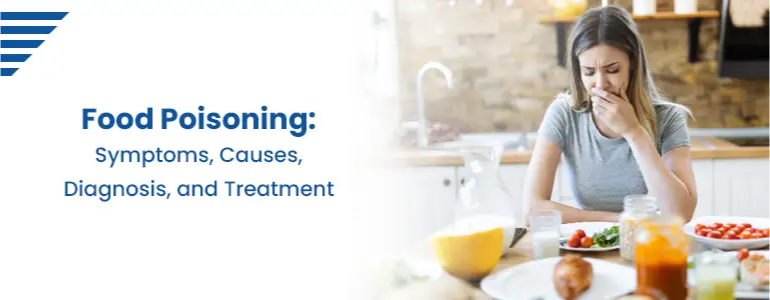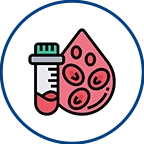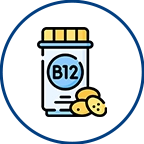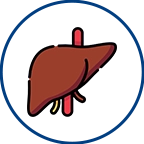Food Poisoning - Symptoms, Causes, Diagnosis, and Treatment

Food poisoning is a common and unpleasant experience when consuming contaminated food or beverages. It can lead to various symptoms, from mild discomfort to severe illness. In this blog, we will explore food poisoning in detail, including its symptoms, causes, diagnosis, and treatment, to help you better understand this condition and how to protect yourself.
Symptoms of Food Poisoning:
Nausea and Vomiting: One of the most common symptoms, you may experience sudden and severe nausea followed by vomiting.
Diarrhoea: Watery or bloody diarrhoea can occur, often accompanied by abdominal cramps and pain.
Fever: Many cases of food poisoning lead to an elevated body temperature.
Muscle Aches: You may experience muscle weakness and discomfort.
Fatigue: Food poisoning can leave you feeling exhausted and weak.
Dehydration: Loss of fluids due to vomiting and diarrhoea can result in dehydration, which requires prompt attention.
Home Sample Collection
Causes of Food Poisoning:
Bacterial Contamination: Bacteria like Salmonella, E. coli, and Campylobacter are common culprits. They can contaminate food during production, processing, or handling.
Viral Infections: Infected food and drink can spread viruses like the norovirus and hepatitis A.
Parasitic Infections: Giardia and Cryptosporidium are parasites that can cause food poisoning when consumed from infected sources.
Toxins: Some foods can produce toxins when left unrefrigerated or improperly prepared, leading to food poisoning. Examples include staphylococcal and botulism toxins.
Diagnosis of Food Poisoning:
If you suspect you have food poisoning, it's essential to consult a healthcare provider. Diagnosis typically involves:
Medical History: Your recent food intake and symptoms will be discussed with your doctor.
Physical Examination: A physical examination may help rule out other potential causes of your symptoms.
Stool Sample: To locate the pathogen causing the food poisoning, a stool sample may occasionally be taken and examined.
Treatment of Food Poisoning:
The treatment of food poisoning focuses on relieving symptoms and preventing complications:
Fluid Replacement: Rehydration is crucial to prevent dehydration. Drink clear fluids, oral rehydration solutions, and electrolyte-rich beverages.
Rest: Rest helps your body recover more quickly.
Medications: Sometimes, your doctor may prescribe anti-nausea or anti-diarrheal medications.
Avoid Certain Foods: Avoid solid foods for a few hours after vomiting or diarrhoea. Gradually reintroduce bland foods like rice, toast, and bananas.
Preventing Food Poisoning:
Prevention is the best strategy for avoiding food poisoning:
Safe Food Handling: Practice proper food hygiene, including washing hands, utensils, and surfaces regularly. Cook meat thoroughly and refrigerate perishable foods promptly.
Be Cautious with Raw Foods: Avoid consuming raw or undercooked eggs, meat, and seafood.
Watch for Recalls: Stay informed about food recalls and avoid products that may be contaminated.
Practice Safe Food Storage: Store food at appropriate temperatures and use leftovers within a safe time frame.
Conclusion:
Food poisoning is an unfortunate but common occurrence that can affect anyone. Understanding its symptoms, causes, diagnosis, and treatment is essential for managing this condition effectively. Following proper food safety practices and seeking medical attention when necessary can reduce your risk of food poisoning and ensure a quicker recovery if you fall victim to it.
Frequently Asked Questions
1. What is food poisoning?
A condition known as food poisoning is brought on by ingesting tainted food or drinks. Consuming dangerous germs, viruses, parasites, or poisons in food can cause it.
2. What are the common symptoms of food poisoning?
Nausea, vomiting, diarrhoea (often bloody), fever, stomach cramps, muscular pains, and exhaustion are typical signs of food poisoning.
3. How long does it take for food poisoning symptoms to appear after eating contaminated food?
Depending on the cause, symptoms might start at different times, but they commonly appear a few hours to a few days after eating tainted food.
4. What are some common causes of food poisoning?
Food poisoning may be brought on by several things, including toxins generated by some foods and bacterial contamination (such as Salmonella and E. coli), viral infections (such as Norovirus and Hepatitis A), parasite infections (such as Giardia and Cryptosporidium), and viral and hepatitis infections.
5. How is food poisoning diagnosed?
Diagnosis usually involves a medical history assessment, physical examination, and sometimes the collection and testing of a stool sample to identify the specific pathogen responsible for the illness.
6. What is the treatment for food poisoning?
The primary treatment for food poisoning is focused on relieving symptoms and preventing dehydration. This often involves fluid replacement, rest, and, in some cases, medications to control nausea and diarrhoea.
7. When should I seek medical attention for food poisoning?
You should consult a healthcare provider if you experience severe symptoms, such as high fever, persistent vomiting or diarrhoea, signs of dehydration (e.g., excessive thirst, dark urine), or if you suspect a severe bacterial infection.
8. How can I prevent food poisoning?
Preventing food poisoning involves practising good food hygiene, including washing hands and cooking utensils, cooking meat thoroughly, refrigerating perishable foods promptly, and avoiding risky foods like raw or undercooked eggs and seafood.
9. Are there specific groups of people more vulnerable to food poisoning?
Certain populations, such as the elderly, young children, pregnant women, and individuals with weakened immune systems, are more susceptible to severe cases of food poisoning and should take extra precautions.
10. What should I do if I suspect that I have food poisoning from a restaurant or packaged food product?
If you suspect a restaurant or packaged food product has caused your food poisoning, you can report it to your local health department or the relevant regulatory agency. This helps identify and address potential food safety issues.
Book Your Slot
Our Locations Near You in Hyderabad
3KM from Banjara Hills
1.9KM from Yusufguda
3KM from Madhura Nagar
5KM from Shaikpet
Profiles
- Cardiac Risk Profile
- Pituitary marker Profile
- Rheumatoid Arthritis Profile
- Dengue Fever Panel
- Lung Cancer Panel 1 Complete Molecular
- Gastroenteritis Screening Panel
- Thyroid Profile (T3,T4,TSH), Serum
- Pancreatic Marker Profile
- STD profile
- Androgen Profile
- Lipid Profile, Serum
- Pancreatic(acute)Profile
- PCOD Profile
Radiology
Pathology Tests
- Glucose Fasting (FBS),Sodium Fluoride Plasma
- Creatinine, Serum
- Glycosylated Hemoglobin (HbA1C)
- Vitamin B12 (Cyanocobalamin), Serum
- Thyroid Stimulating Hormone (TSH) Ultrasensitive, Serum
- Complete Urine Examination (CUE), Urine
- Liver Function Test (LFT),Serum
- Dengue (IgG & IgM), Serum
- Dengue Antigen (Ns1) Rapid, Serum
- C-Reactive Protein (CRP), Serum
- Widal (Slide Method), Serum
- Total IgE, Serum




